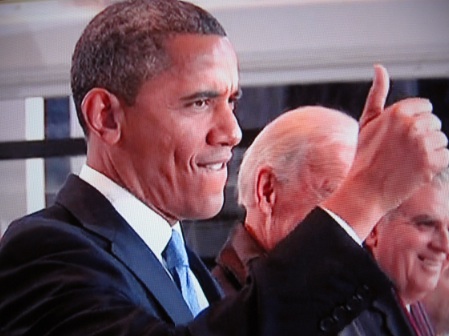‘Our journey is not complete’:
Obama begins his second term
In a second inaugural address that will go down as one of the finest, most evocative orations of his political career and one of the very best in modern American presidential history, President Obama offered a speech that was at once a road map of his priorities for the second term (which, practically speaking, began the day after the election); a spirited pushback against the persistent neoconservative ethos; and a figuratively and literally full-throated defense of liberalism as a bedrock American value, a defense that weaved seemingly disparate social struggles into the long arc of the national narrative.
His second inaugural address, coming on the date of the observance of the Martin Luther King Jr. federal holiday, bore the obvious resonance of the nation’s racial history. But when Barack Hussein Obama II took the oath of office Monday afternoon, the United States crossed more than its second major Rubicon of race in four years.
With the inauguration, which happened in front of maybe 1 million people on the National Mall, the Obama presidency attained gravitas beyond the fact of a second term. The nation returned its first African American chief executive to the White House, true enough, but just as surely as Barack Obama reset the race-centric baseline of American possibility in 2008, he ventured on Monday to reset the perception of progressive American values in the national life.
Ronald Reagan endeared himself to conservatives and Republicans at his 1981 inaugural, wedding himself to the cause when he said that “In this present crisis, government is not the solution to our problem; government is the problem.”
With a first term crowded with signal achievements, Obama delivered a charitable, ambitious and panoramic speech that indicated he has no intention of taking his foot off the gas as a driver of political and social change. In the process he offered a sturdy refutation of Reagan’s 1981 thinking: In this present crisis, at this time and place in the nation’s history, government damn well better have a role in being part of the solution.
◊ ◊ ◊
“[W]e have never relinquished our skepticism of central authority, nor have we succumbed to the fiction that all society’s ills can be cured through government alone,” the president said. “Our celebration of initiative and enterprise; our insistence on hard work and personal responsibility, are constants in our character.
But we have always understood that when times change, so must we; that fidelity to our founding principles requires new responses to new challenges; that preserving our individual freedoms ultimately requires collective action. ... Now, more than ever, we must do these things together, as one nation, and one people. ...
“My fellow Americans, we are made for this moment, and we will seize it – so long as we seize it together.” This last sentence seemed to echo Obama’s 2008 Election Night message of how “we have never been a collection of Red States and Blue States: we are, and always will be, the United States of America.”
◊ ◊ ◊
TIME AND time again, the president hammered home that collective message (repeating the opening words of the Constitution). There was a ringing endorsement of safety-net programs soon to be under fire: “We, the people, still believe that every citizen deserves a basic measure of security and dignity. We must make the hard choices to reduce the cost of health care and the size of our deficit. But we reject the belief that America must choose between caring for the generation that built this country and investing in the generation that will build its future.”
On climate change and environmental stewardship: “We, the people, still believe that our obligations as Americans are not just to ourselves, but to all posterity. We will respond to the threat of climate change, knowing that the failure to do so would betray our children and future generations.”
On the use of American military might: “We, the people, still believe that enduring security and lasting peace do not require perpetual war. ... we are also heirs to those who won the peace and not just the war, who turned sworn enemies into the surest of friends, and we must carry those lessons into this time as well.”
◊ ◊ ◊
What may have been the speech’s most galvanizing moment came shortly before it ended: “We, the people, declare today that the most evident of truths – that all of us are created equal – is the star that guides us still; just as it guided our forebears through Seneca Falls, and Selma, and Stonewall ...
Conflating in the annals of social struggle the Seneca Falls Declaration of 1848 (central to women’s rights); the Selma-to-Montgomery marches of 1965 (pivotal to the civil rights movement); and the Stonewall riots of 1969 (a watershed of the gay rights movement), President Obama brilliantly linked three seemingly unconnected events of our national history and made them touchstones for the national future.
“[O]ur journey is not complete until our wives, our mothers, and daughters can earn a living equal to their efforts. Our journey is not complete until our gay brothers and sisters are treated like anyone else under the law – for if we are truly created equal, then surely the love we commit to one another must be equal as well.”
“Our journey is not complete until no citizen is forced to wait for hours to exercise the right to vote. Our journey is not complete until we find a better way to welcome the striving, hopeful immigrants who still see America as a land of opportunity; until bright young students and engineers are enlisted in our workforce rather than expelled from our country.
“Our journey is not complete until all our children, from the streets of Detroit to the hills of Appalachia to the quiet lanes of Newtown, know that they are cared for, and cherished, and always safe from harm.”
◊ ◊ ◊
REACTIONS TO the speech ran the gamut. James Fallows in The Atlantic said the speech was “the most sustainedly progressive statement Obama has made,” adding that the speech “made news and alters politics in a way I had not anticipated.”
On Fox News, the conservative columnist Charles Krauthammer called Obama’s speech “amazing” and “very important historically,” while adding that the address wasn’t “memorable” (leaving inquiring minds to ask how a speech can be “very important historically” without being “memorable” by definition).
“Fox News Sunday” anchor Chris Wallace was thumbs-down. “I don’t think he reached out to the other side at all,” he said, missing the point of the speech. With four years of precedent, four years of demonization by conservatives and their handlers and proxies in the media — Obama delivered a speech that basically indicated he didn’t intend to try reaching out to the other side. Not anymore. Or at least not like before.
◊ ◊ ◊
Some in the media understand just what a gauntlet throwdown all this is for the Republicans.
Ben Smith at BuzzFeed writes: “The soaring rhetoric of inauguration provokes, in many political writers and analysts, the understandable temptation to puncture the rhetorical balloon at its most inflated. For some conservatives, that means noting Obama’s relative unpopularity; for others, it means simply declaring his victories hollow.
“But you can also feel the way the country's imagination is turning, and see Republican pragmatists begin to reposition themselves around it.”
Matthew Continetti, writing in the conservative Washington Free Beacon, saw the wall’s oversize handwriting three days before the inaugural address:
“The generation of conservatives and Republicans who return one day to power will be forced to reckon with the consequences of the Obama revolution, just as a generation of defeated liberals were forced to confront and in some cases accept the revolution of Ronald Reagan.”
◊ ◊ ◊
THAT WILL certainly be true. And consider another recent forecast. Writing in Politico before the November election, Jim VandeHei and Mike Allen observed that: “If Obama wins, he will be dealing with a House Democratic Caucus more liberal than he is. The past four years have decimated the once-strong bloc of conservative Southern Democrats, leaving behind a caucus more liberal than ever.”
That may have been a problem for him before the election, or at least a challenge. Obama’s Inauguration Day cri de coeur, maybe the most aggressively, unapologetically progressive inaugural address ever, suggests it’s not a problem for him now.
Obama’s inaugural comments may well have been directed as much to that liberal caucus as to his more reliable Republican opponents — as a way of letting all of them, friend and foe alike, know that the president intends to chart a new course for his second term, a decided shift from the reflexively anodyne, conciliation-at-all-costs identity of the first term. And maybe in a direction that dovetails with the left-leaning caucus more than its members might think.
Let the word go forth, again: Elections have consequences. Chief among them is the fact that a candidate (or an incumbent) implicitly acquires leverage after winning one.
That was the thrust, the underlying takeaway from a second-inaugural speech that conservatives may yet find “memorable,” but for a reason they haven’t considered: because it marks the bright dividing line between an emerging iteration of Barack Obama — inchoate but energized — and the comfortable, reliable, predictable Barack Obama, last term’s model, and one soon to be discontinued.
Image credits: Obama: Via MSNBC (possible reviewing-stand pool feed). Obama takes the oath: Via The Huffington Post. BuzzFeedlogo: © 2013 BuzzFeed Inc. Fox News logo: © 2013 Fox News Channel.

.jpg)


.jpg)


.jpg)
Comments
Post a Comment